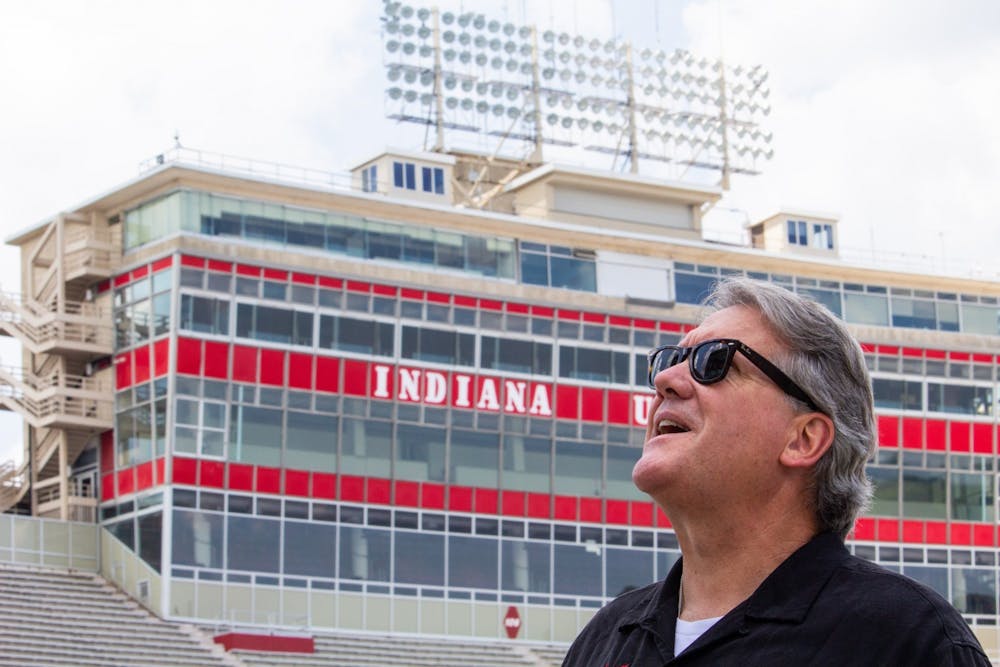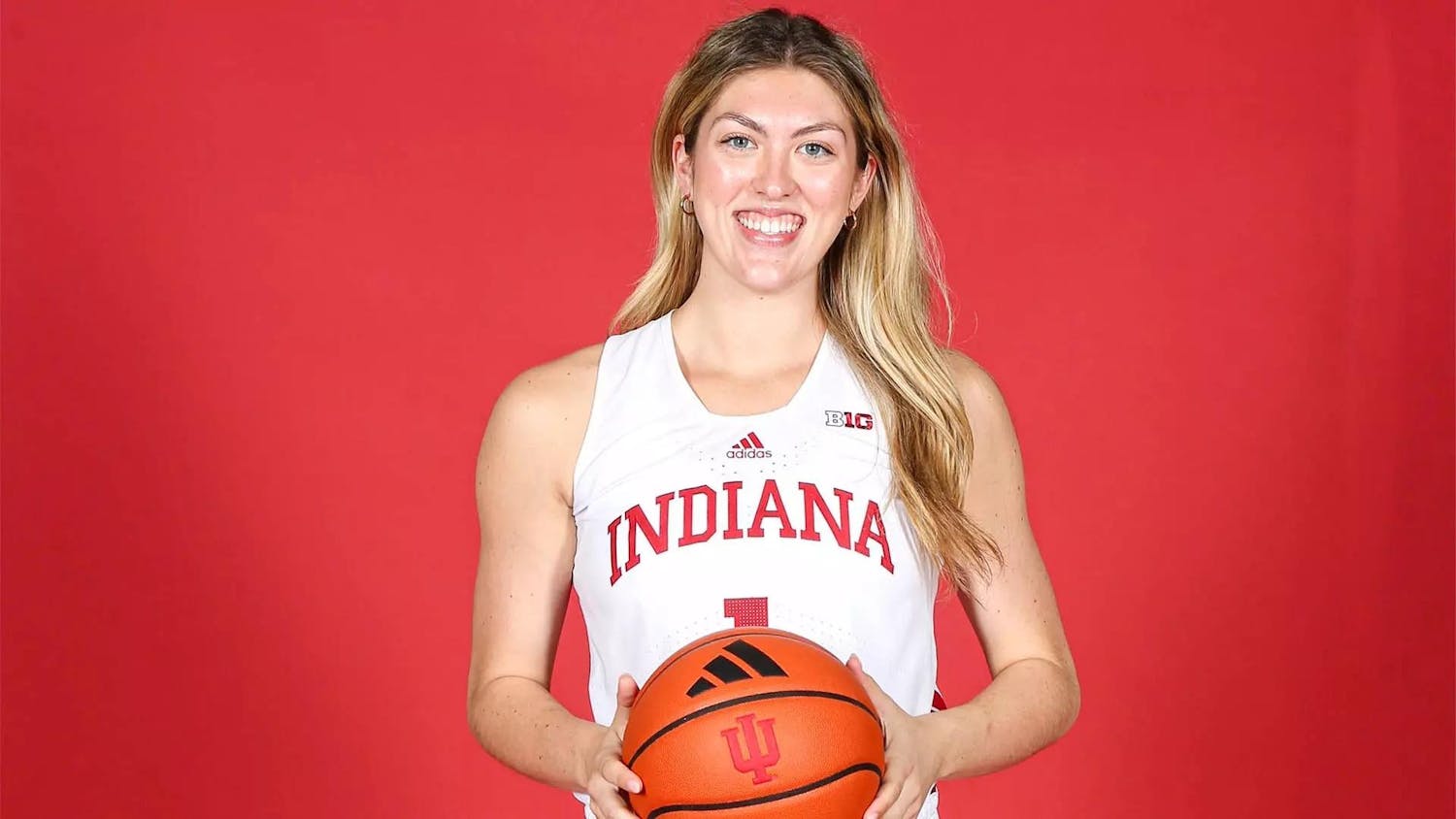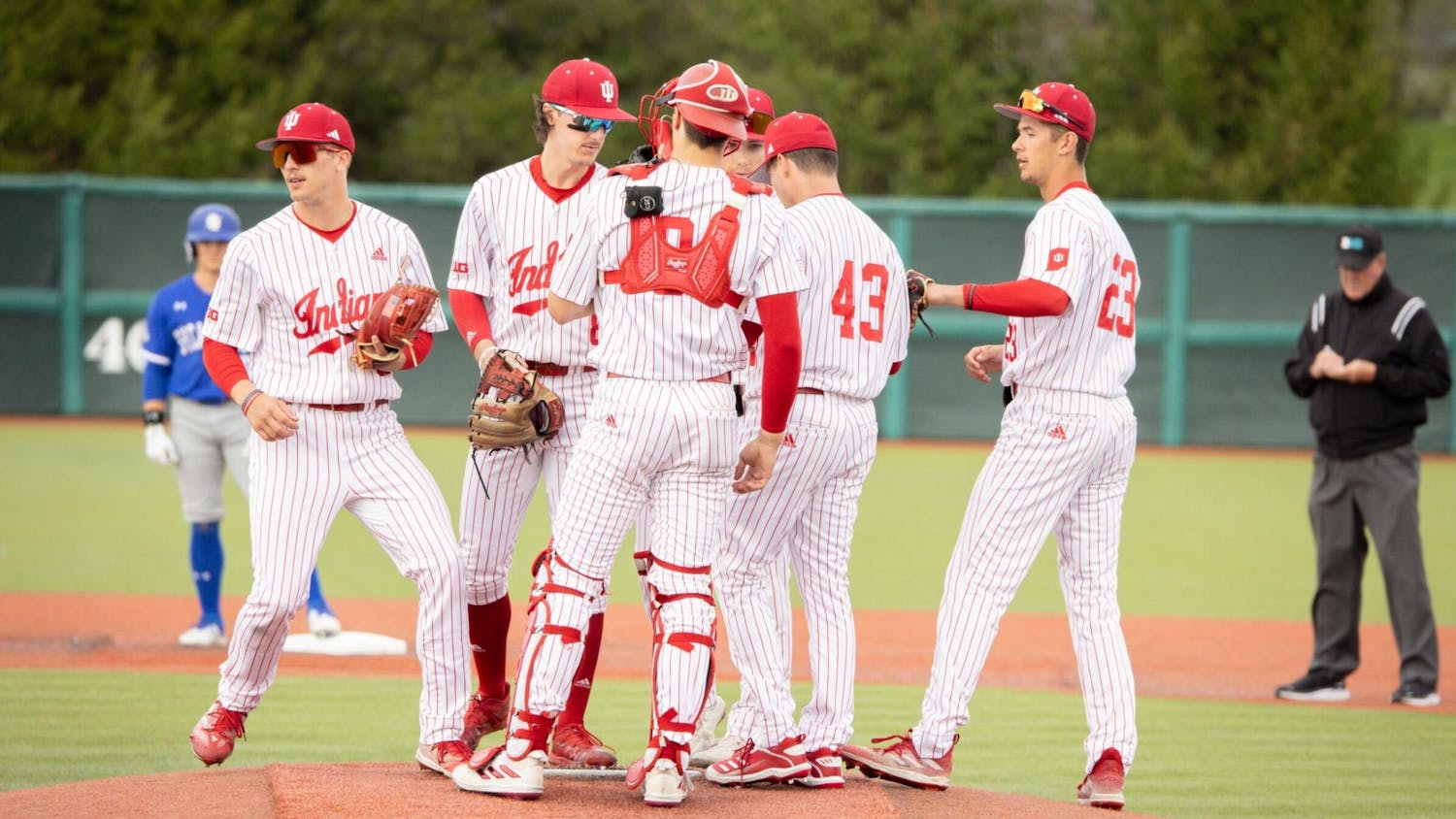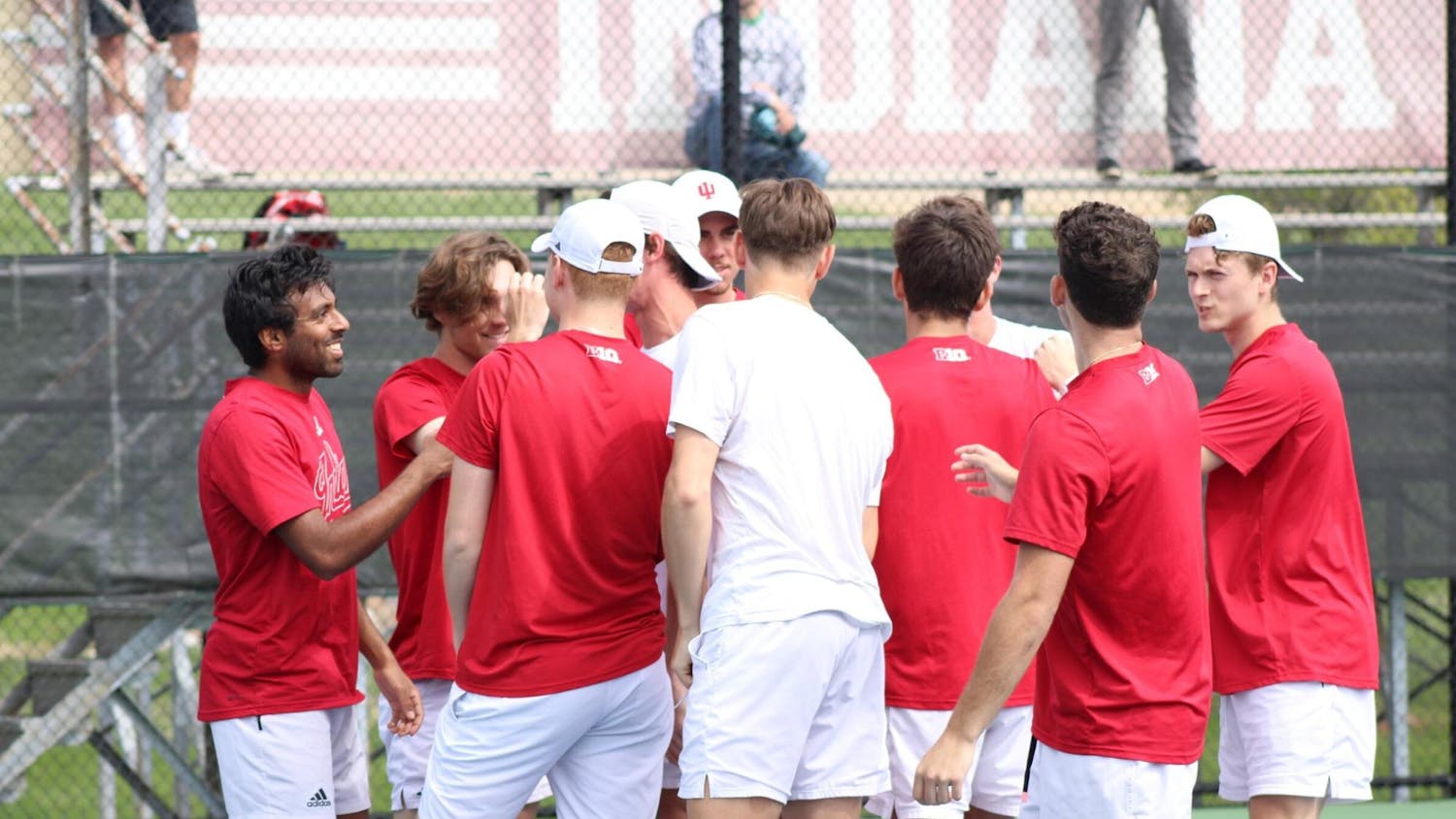Start with the plastic football, the one that’s faded and gathering dust. It’s from IU’s first and only appearance in the Rose Bowl 53 years ago. Fred Glass picked it up when he was nine years old, on his first-ever trip to Bloomington with his pal Jimmy Muhler. Today it sits in his office on the 35th floor of the Regions Tower in downtown Indianapolis.
“I’ve moved a million times, gone here and gone there, but I always save that,” Glass says.
His mother, Rosemary, an IU alum, used to walk around the house wearing Nick’s English Hut sweatshirts. When they weren’t watching games on television, they were listening on the radio.
When he was a junior in high school, Glass returned to Bloomington with Brian Brase. He was hooked. He was home.
“It was the greatest weekend of my life,” Glass remembers.
Two years later, in the fall of 1977, he moved into McNutt’s North Courtyard, Bordner room N308.
A miniature sculpture of Branch McCracken and Bill Garrett looms large on Glass’ windowsill, a reminder of a program that used to set the standard in college basketball but no longer does.
“Nobody wanted to get Indiana back to elite basketball status more than me. That is literally a fact,” he says. “Because number one I’m a fan, like every goof with a Twitter account.”
“Plus it was my job.”
Glass was a senior in 1981 when IU defeated North Carolina to win the NCAA championship. He remembers the party that stretched from Showalter Fountain down to Kirkwood Avenue and the feeling that came with it. “Bedlam,” he calls it.
And that was always the goal. Eleven years as athletic director, and the team never advanced past the Sweet 16. Glass fired Tom Crean in 2017 after nine seasons, tapping Archie Miller to lead the program in a new direction.
The Miller era never really took off.
He was fired in March, almost a year after Glass stepped down as athletic director.
It was a rare black mark on Glass’ legacy. Even now, it eats at him.
“I think Archie had a great plan,” Glass says, looking back. “But I think when it’s all said and done, it’s a results oriented business. It was a sad day for me.”
Across the office sits five, motionless bobble heads. IU women’s basketball legends Tyra Buss and Amanda Cahill surround Tony Dungy, Bobby Leonard and Barack Obama – a reminder to Glass of all the good things that happened inside Assembly Hall.
He hired Teri Moren, the women’s basketball coach who’s taken the program deeper than it’s ever gone in the NCAA tournament, into the Elite Eight this past spring. It was a massive success for a program that has long lived in the shadow of its male counterpart.
Glass laid the groundwork for the Cuban Center, a revolutionary, student-focused video broadcasting and technology center built within Assembly Hall.
Both Glass and Mark Cuban are proud alumni of the class of 1981, and Cuban was a philanthropic target of Glass. In 2013, Glass flew to Dallas with Hoosier football legend and associate athletic director Anthony Thompson to pitch Cuban on renovating Assembly Hall.
The problem was: Cuban doesn’t do buildings.
“I would support something that would create the kind of students I want to hire someday,” Glass remembers Cuban telling him.
They decided on an alternative, a blend of sports and technology. Glass knew Cuban hated the backstory of a pitch, his biggest pet peeve on Shark Tank, so he had four points prepared on a 3x5 notecard. Hoping for $5 million, Glass got two points in before Cuban held up his hand.
“I’ll give you five million dollars.”
Done.
Down the line, Cuban and Glass met at the bar of the Conrad Hotel in Indianapolis after a 2015 Mavericks-Pacers game. There, a compromise was struck: Glass convinced Cuban to put his name on the technology center, a buildout in Assembly Hall, not a stand-alone building.
Cuban was in the stands at Assembly Hall five years later for another signature afternoon of the Glass era: the day The General came back.
Glass always knew it would be the former players who convinced Bob Knight to return. So he mended the relationship as best he could, then he got out of the way.
IU was celebrating the 40th anniversary of the 1980 men’s basketball team. It felt like the right time. Randy Wittman, a former Knight player, decided to try and bring his old coach home.
“All the other blueblood programs have managed to stay tied to their patriarch, except us,” Glass says.
During halftime of a regular season matchup with Purdue, scores of former players were introduced to a capacity crowd. The big screen showed an empty hallway well within the bowels of the college basketball cathedral. Being held up by Quinn Buckner, Scott May, Steve Green and his son, Pat, Knight turned the corner and emerged.
The building erupted.
“I was just so happy, there were players that had not been back in that building since they walked out on senior day,” Glass says. “I still have chills about it. When he came in and the fans were going crazy and grown men were crying and the players were crying — it just hit how important it was.”
“It’s very rare, in anything, for everything to change in one second,” he continues. “(But) when he came back, everything changed. Reconciliation. Forgiveness. The family (was) back together.”
Right next to the sculpture of McCracken and Garrett sits a No. 24 Riddell IU helmet. On the file cabinet, a yardstick reads, “THE GRADUATE AT GRADUATION: OPEN TO GROWTH - INTELLECTUALLY COMPETENT - RELIGIOUS - LOVING - COMMITTED TO PROMOTING JUSTICE.”
Rick Greenspan resigned as IU’s athletic director in December of 2008. The school was less than a decade removed from the Knight firing. Terry Hoeppner, the head football coach who many believed would restore the lost program, died of glioblastoma in the summer of 2007. And Kelvin Sampson was forced to resign in early 2008 after several NCAA violations.
IU was looking for its fifth athletic director in the last eight years. The place was a mess.
When IU President Michael McRobbie decided to hire Glass, who at that point had zero experience working in athletic departments, Glass knew he would have to do more than hire new coaches.
“I really felt like to lead it, I had to heal it and to do that we had to rally around something bigger than our individual jobs,” Glass says.
Using themes he borrowed from The Graduate at Graduation, it started with the Four Priorities – which became the Five Priorities. Then, Spirit of Indiana: 24 Sports, One Team. Finally, the Excellence Academy and the Indiana University Student-Athlete Bill of Rights.
“Nobody else dedicates the kind of real estate and resources that we do to develop our kids personally and I think that’s the special sauce,” Glass says. “I think that’s the thing that distinguishes us from other schools.”
Glass takes pride in his Jesuit upbringing. In prep school he learned the importance of cura personalis, a phrase that still sticks in his head all these years later. Translation: care for the whole person.
In his athletic department, it was never just about the athlete.
Above the file cabinet are various awards and newspaper clippings from Glass’ long career. Chief among them, a distinguished alumni award from IU Robert H. McKinney School of Law in Indianapolis.
After graduating from IU with a political science degree in 1981, Glass started law school.
Needing a place to live, he was put in contact with Mick Terrell, another IU grad looking for a roommate. After a phone call, the two broke law students decided they would live together at the Riverpointe Apartments off White River Parkway.
“I’m not going to lie to you and tell you it was some kind of palace,” Glass says.
“(It) was a former condemned HUD building that somebody came in and decided to make it into somewhat presentable living quarters,” Terrell remembers.
But it was a perfect match. They pulled pranks inspired by The Hand, a horror movie about a murderous, detached hand. They chose to form a two-man study group instead of working with others because they trusted each other. Fred set Mick up with his childhood friend, Julie. Mick and Julie have been married for 36 years.
Fred would sometimes let Mick borrow his car, too.
They called it the cue ball, Fred’s white, 1963 Ford Fairlane, because their friend, Marcus Freihofer, had a black, 1962 Ford Fairlane that they called the eight ball.
“It was super old and it was really crummy,” Terrell said.
One snowy day, Mick took the cue ball to the law school library. Covered in snow by the time he left the library, Mick ran into a light post, a big concrete one, putting a big V in the back of the car. Mick got home and told Fred he’d better take a look.
“Man, I’ll pay for it, whatever you need,” Mick told him. “I’m really sorry.”
“Give me a 12-pack of Stroh’s and we’ll just call it even,” Fred told him. And that was that. Almost 40 years later, Fred and Mick now work together at Taft.
Behind The Graduate at Graduation yardstick is a miniature Old Oaken Bucket propping up a baseball signed by IU’s 2013 College World Series team. To the left a red shark with a white IU logo swallows a gold shark with a Purdue logo.
After a few months on the job, Glass had begun the culture shift within the athletic department. But he knew there was one piece missing.
“When I got there in 2009 the athletics campus looked a lot like it did – almost exactly like it did – when I left as a student in 1981,” Glass said.
The baseball team was playing on a high school quality field, the softball squad a middle school quality field. The volleyball and wrestling teams were literally playing in a high school gym. Assembly Hall was falling apart. Memorial Stadium was two concrete bleachers facing each other, like a 6A high school stadium.
“Our football stadium literally had barbed wire fence going around it,” senior associate athletic director Jeremy Gray says. “(Former IU baseball coach) Tracy Smith brought his dog to the game and tied it to a pole outside of the dugout … it was worse than my high school field.”
“You couldn’t find a volleyball game with a bloodhound and a compass,” Glass says.
So Glass and his team went to work. During his time as AD, they built Andy Mohr Field (softball), Bart Kaufman Field (baseball), Wilkinson Hall (volleyball and wrestling), the Pfau Golf Course, the south endzone Excellence Academy and renovated Assembly Hall. By the time he retired in May of 2020, he had spent a quarter of a billion dollars facelifting IU athletics.
“Fred figuratively and literally rebuilt the foundation of IU athletics,” says his successor, Scott Dolson.
And he was rewarded for his investments.
The baseball team made their first-ever appearance in the CWS in 2013. Indiana’s football team has won five of the last seven Old Oaken Bucket games. Teri Moren has more wins than IU’s three previous women’s basketball coaches combined. The men’s soccer team won an NCAA Championship in 2012 and the women’s program is on a steady uptrend. Wrestling and volleyball are beginning to hold their own in a conference that they have long been dominated in.
A campus was rebuilt, a culture renewed.
“As a Purdue alum, I’m sorry to say he strengthened the athletic department at Indiana University,” says former Mayor of Indianapolis, Bart Peterson, a former Glass colleague and longtime friend. “When I’d go to a basketball game in Bloomington, I’d wear red.”
On the left side of Glass’ bookshelf is a picture of him and Tom Allen after the football team's breakthrough win at Nebraska in 2019.
Glass took a big risk when he parted ways with Kevin Wilson in 2016, and an even bigger risk when he decided to promote Tom Allen, then his defensive coordinator. Allen’s lone head coaching stop to that point? Ben Davis High School in Indianapolis.
Five years later, IU football is the best it's been in decades.
Ask Allen about his old boss, and it’s the private moments that stick out, like walking with Glass from the locker room to the press conference after games.
“I’ll never forget, he never criticized, he was always very encouraging and was right there beside me through the good and the bad,” Allen says.
Men’s soccer head coach Todd Yeagley remembered the hug they shared after the team got back from Hoover, Ala., in 2012 fresh off a national championship victory.
“Todd, you made my first hire look pretty darn good,” Glass told him.
Volleyball head coach Steve Aird remembered their first meal at a back corner table at Malibu Grill. They got there at 6:30 and didn’t leave until 2:00 in the morning. They didn’t talk much about volleyball.
“It was about family and kids and travel and food and drink, the things that are cool in life,” Aird said.
To the right of the deflated Rose Bowl football is a replica of the Indiana Statehouse.
Glass got his start in politics in the fall of his senior year at IU. In the spring he applied for an internship with U.S. Senator Birch Bayh of Indiana, and got it. This started a relationship with the Bayh political family that has lasted more than 40 years.
“Barb and I co-hosted the first fundraiser Evan Bayh ever had for Secretary of State, raised $1,000 and thought it was the best thing that ever happened in our lives,” Glass says.
Bayh’s bid for Secretary of State in 1986 was a success, but Glass chose to continue practicing law. In 1988, Bayh began his campaign for governor. Glass once again was tapped to help out by driving him around and helping with issue work. Bayh won and Glass was offered the position of Executive Assistant for Transportation.
“I don’t know anything about transportation,” Glass told him.
“Well I don’t care about that, I’m really hiring you for your judgement,” Bayh responded. Glass took the job.
Around this time, Peterson was hired as the Executive Assistant for Environmental Agencies. He first met Glass at a fundraiser on Sunset Lane in Indianapolis.
When Glass was eventually promoted to Chief of Staff, he made Peterson his deputy.
“Fred’s a guy who puts on no airs at all,” Peterson says. “Whatever an elitist is, he's the opposite of that.”
When Glass left for Baker & Daniels in 1993, Peterson took over as Chief of Staff. It wouldn’t be the last time Glass entered the political arena, nor would it be the last time he and Peterson worked together.
To the right of his filing cabinet stands a shovel used at the groundbreaking ceremony of Lucas Oil Stadium. In the opposite windowsill sits a Bell helmet signed by Mario Andretti with the blue Indianapolis Colts logo on it.
Glass worked at Baker & Daniels largely without interruption until 2000 when Peterson, by then the newly-elected Mayor of Indianapolis, gave him a call. He wanted Glass to chair his transition team. He wanted Fred to work with his campaign manager, Mike O’Conner, on selecting his senior leadership.
“He brought a different perspective,” Peterson says. “A good friend, a trusted friend, but also an outsider.”
Baker & Daniels remained his full-time job, but when Peterson asked him to volunteer more of his time to preside over the Marion County Capital Improvement Board, Glass couldn’t resist.
During his almost eight years in charge of the CIB, Glass and his team were responsible for making sure the Final Four came to Indianapolis at least once every five years, keeping the Colts in Indianapolis, replacing the RCA Dome with Lucas Oil Stadium, expanding the Indianapolis Convention Center and putting together the bid for Super Bowl XLV. A year later, with a very similar bid, Indianapolis was lauded for hosting Super Bowl XLVI.
When they put the bid together for the Super Bowl, they sent a replica of Lucas Oil Stadium to the NFL owners. When they opened it up, there was a basketball signed by Oscar Robertson and Larry Bird, a PGA Championship flag from Crooked Stick Golf Club signed by John Daly and a Bell helmet signed by Mario Andretti. A uniquely Hoosier touch.
Colts owner Jim Irsay later gave his helmet to Glass.
To the left of his standup desk are two photos. In one, he’s shaking hands with Bill Clinton. In the other, he’s playing pickup basketball.
Glass was the democratic state chair of Clinton’s 1996 presidential campaign, his only interruption while working at Baker & Daniels before he chaired Mayor Peterson’s transition team.
Why the picture of himself playing pickup basketball? The black and white photo was a gift from the governor. A young Glass, hair flopping in the wind, drives to the hoop, defended by
Governor Evan Bayh while current Mayor of Indianapolis Joe Hogsett and the former Attorney General of Indiana, Jeff Modisett, watch helplessly in the background.
“To Fred Kareem Glass,” it reads, “thanks for proving the administration is not weak on defense.”
Next to the Distinguished Alumni Award hangs the Trevor R. Brown Award, an award given by the IDS honoring the recognition of “your belief in student journalists and loyal support of their work on Student Media at Indiana University.”
“That's one of my treasured things,” Glass says.
Glass sits at the table in his blue oxford, unbuttoned with no tie, glasses in his front pocket. Now 62 years old, he takes a sip from his lemon Bubly and thinks about his legacy.
“We don’t get to choose our own legacy and when all’s said and done I think the legacy lives in the hearts of the people that you touch,” he says.
Like Mattie White, who worked under Glass at IU as an associate athletic director: “It makes it easier to know that you’re in this with someone who doesn’t see you as a position, but sees you as a person and wants what's best for you.”
She’s fighting back tears.
“During the time that Fred was here we grew, our students grew, (and) I grew as a person. He invested in people, he invested in us.”
Or Gray, the associate athletic director: “(Fred’s) a builder. Building a fan base, building trust, building a good coaching staff, building a coherent brand in my area. There is not one time in 11 years that I went to sleep uncomfortable, ethically, with what I was asked to do by my boss.”
Or Dolson, his successor: “I feel very fortunate that I had the opportunity to be around Fred in such a significant way … As a person and as a friend, he was just as good as it gets.”
Or Aird, IU’s volleyball coach: “The best thing I can say about him is that I miss him dearly because I appreciated him as a guy.”
Or Mick, his friend of 40 years: “I always say if I’m on top of a burning building and I have one phone call to save my life, he’s the guy I’m probably going to call, because not only will I know he’ll try to do it – he’ll figure out how to get a helicopter to the top of the building and save me.”
Finish with the George Taliaferro statue, which sits on the right windowsill of Glass’ office. It’s a bridge to IU’s past.
Glass was in his 15th year working at Baker & Daniels with one of the biggest books of business at the firm when Rick Greenspan resigned as IU Athletic Director. Bill Stephen was chair of the search committee and a law school classmate of Glass.
And it was his idea that his old classmate consider the job.
Stephen reached out and told Glass he should think about applying.
“I thought it was the craziest thing,” Glass says.




